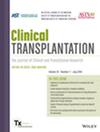Economic Impact of Dementia After Kidney Transplantation: A Matched Cohort Analysis
Abstract
Background
Kidney disease significantly increases the risk of dementia, including among kidney transplant (KTx) recipients. To date, the cost implications of dementia after KTx are not well described.
Methods
We performed a retrospective cohort study of US Renal Data System (USRDS) data (2006–2020) to estimate cost of care for ≥65-year-old Medicare insured KTx recipients (2006–2020) with newly diagnosed dementia (n = 3285), compared to propensity-matched controls without dementia (n = 6570). KTx recipients age 65+ years with post-KTx dementia were identified by diagnosis codes, and costs were computed based on payments on Medicare claims. Average costs per month, marginal costs per month, and cumulative costs were compared after dementia diagnosis versus after the equivalent time post-KTx in controls.
Results
Dementia was diagnosed at a mean of 5.1 ± 3.4 years post-KTx. Patients' characteristics were well matched in cases versus controls, including age (mean: 70.1 vs. 69.9 years), sex (38.4% vs. 37.9% women), race (23.7% vs. 22.2% African American), and cause of ESKD (45.4% vs. 43.7% diabetes). Over 4 years post-KTx, dementia was associated with reduced survival (27% vs. 68%) along with $66 145 (95% CI $51 560-$78 489) higher Medicare spending. Average monthly costs in dementia patients reached a maximum of $12 713 and exceeded the cost of unaffected patients by up to $9789 per month.
Conclusions
Post-KTx dementia dramatically increased resource utilization and reduced post-KTx surivival. These findings highlight the need for care pathways that better integrate cognitive health assessment and management into the care of KTx candidates and recipients.

 求助内容:
求助内容: 应助结果提醒方式:
应助结果提醒方式:


